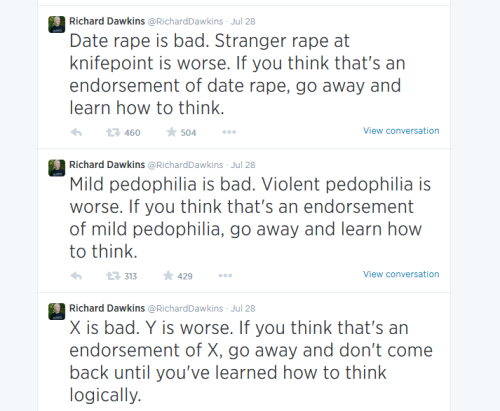This week saw the English evolutionary biologist, ethologist and writer Richard Dawkins ignite another Twitter storm, something he’s not unfamiliar with.
On Monday he tweeted (starting from the bottom):
 … and all hell broke out (and not just on Twitter).
… and all hell broke out (and not just on Twitter).
Later in the week he posted a piece on his blog entitled ‘Are there emotional no-go areas where logic dare not show its face?‘, referring to his tweets and stating that “These dilemmas are uncomfortable. It is the business of moral philosophers to face up to the discomfort and teach their students to do the same.”
“I deliberately wanted to challenge the taboo against rational discussion of sensitive issues. I had noticed indications that rape and pedophilia had moved out of the discussion zone into a no-go taboo area. I wanted to challenge the taboo, just as I want to challenge all taboos against free discussion. Nothing should be off limits to discussion.”
“The point was a purely logical one: to judge something bad and something else very bad is not an endorsement of the lesser of two evils. Both are bad. I wasn’t making a point about which of the two was worse. I was merely asserting that to
express an opinion one way or the other is not tantamount to approving the lesser evil.”
While Dawkins’ examples to show a comparison doesn’t act as an endorsement were deliberately shocking, my mind wandered to some lesser shocking taboo subjects which are just as difficult to discuss with reason, the main one (naturally for me) being grief. A topic where it’s almost impossible, if not impossible, to leave aside emotion and confront it only with reason.
And this whole idea of emotions preventing us from being able to freely discuss certain topics, hypothesise and logically reason, has been swirling around my head all week. On one level it’s the childlike defence mechanism of covering your ears and drowning out what you don’t want to hear with ‘la, la, la’ and on another level it’s protecting yourself from a topic that’s too painful for you (any news story about a dying child has me either leaving the room or erecting my invisible bubble around myself to shut it out).
Hubby sometimes tells me off for blocking out topics I don’t want to hear. I like to think though that it’s more of a thoughtful response, a logical choice – I’m choosing to take myself away from a situation in order to keep my strength;
choosing ‘flight’ over having to ‘fight’ my emotions. I don’t see that in this case I’m one of “those whose emotions prevent them from going anywhere near the conversation” (as Dawkins posted).
Before I lost my daughter, logic and reasoning ruled my world. If you asked me how I was, my reply would involve descriptions of things that had happened without any connection to any kind of emotion (although I was unaware of this at the time). In fact most emotions for me focused on words rather than anything resembling a feeling, and I was very good at choosing the perfect words.
When Sofia died, this became a major issue for me. I could easily recount the events that lead to her death; I could tell you what she looked like and how she smelt and how heavy she felt in my arms, but how did not being able to hold her or smell her or see her make me feel? I had no idea how to express that or even to recognise the immense range of emotions that suddenly were fighting to be felt.
Words and thoughts are logical and controllable. They make sense. They are wonderfully neat and precise. Emotions are not.
It’s much easier to discuss topics that are free from emotion or that can be easily detached from emotion. Put emotion into the equation and suddenly there are untold rules about what can and can’t be agreeably discussed.
Stumbling along my grief path I’m learning how to simply feel moments without having to put them into, not only the right words but, any words at all. I’ve found this new skill very freeing and also makes life a lot lighter when I’m not being
weighed down by the dictionary in my head. I can be in the moment more and savour the emotion (or feel it fade if it’s not a positive one).
I think this has also made me a more rational emotional human being. No, I’m not taking a backwards step and going back to defining rather than feeling my emotions! Before I was very similar to a toddler who easily gets frustrated and loses his temper dramatically and often without warning because he’s still learning to communicate his needs and feelings, and the only tool he has is a tantrum. Over time most toddlers will learn healthy ways to manage and express their strong emotions. Unfortunately I didn’t surpass the emotional age of two.
Perhaps many of us, for whatever reason, don’t move a great deal past the toddler who’s emotions rule his behaviour, unable and unwilling to understand logical reasoning, and lashing out at those who do.
